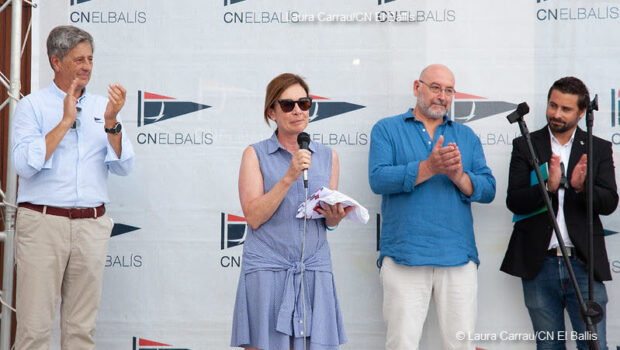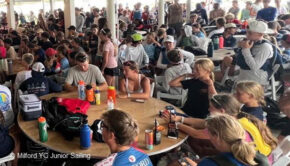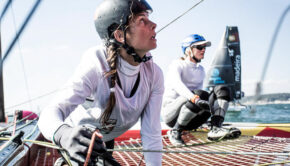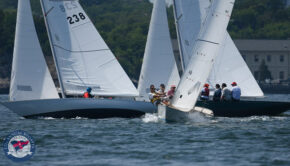Maintaining fun for lifelong sailing
Published on July 26th, 2023
by Craig Leweck, Scuttlebutt Sailing News
While institutional boats like the Club Flying Junior and Club 420 dominate the USA youth racing calendar, the push toward higher performance and ‘something more’ has opened the door for the 29er Class.
As the younger sibling to the Olympic 49er and 49erFX Skiff, the 29er has been elbowing its way forward, most recently replacing the C420 as the doublehanded boat at the 2023 US Junior Women’s Championship.
The fleet was small, much smaller than the year before, and far less than the inaugural C420 Women’s North Americans. But building momentum takes time, and providing alternatives and opportunity for young women to sail speedy boats should be a good thing. Time will tell.
I recently met – by email – International 29er Class President Joan Mollerus who also lives in the USA and has worked tirelessly for over eight years to ensure the success and growth of the 29er fleet around the world. Here are her thoughts on this involvement:
How long have you been involved with the 29er Fleet and how did you get involved?
I followed three of our four children into sailing and into the 29er Fleet. When they started sailing, I quickly realized sailing was a youth activity I wanted to support, and I became involved with our local club program. When our children got into 29er sailing I knew immediately I wanted to be involved with this fun and exciting fleet.
How long have you been the International 29er Class President?
I became Class President eight years ago, in 2015, and served as class Treasurer from 2013 to 2015. The upcoming end of my term is very bittersweet: I will miss the sailors and all the people who support them as well as our amazing class leadership. I’m very proud of all the great work our organization has done in the past 10 years and am confident the class will continue to grow and develop in the years to come.
What do you think are the biggest challenges of the job?
We are a global class with truly global reach. Each area of the world approaches youth sailing in its own way to meet the needs that are unique to its sailors. The class must work to respect and understand each country’s needs and craft our international programs and regattas accordingly.
How has the fleet changed since you have been involved and how is it similar?
It’s grown! 29er sailing has grown globally and it continues to grow, particularly among the girls’ fleet. We worked hard to create a pathway for Women’s World Champion and Women’s European Champion titles. As soon as those titles were available, national organizations around the world increased their investment in girl’s teams and we see more and more girls sailing 29ers each year. While this growth has been taking place, our fleet has maintained its sense of fun, comradery, and sportsmanship — and I hope the fleet holds onto this forever.
What do you like most about the International 29er fleet?
It’s fun! Youth sports globally has become a very serious game and it risks forgetting some very important things: our sailors are children and 29er sailing is a sport. It should be fun, and our fleet has maintained that sense of fun.
What are the biggest things you have learned since being involved with the 29er fleet?
There are many ways for a youth sailor to be “successful.” There is neither a single pathway to success nor a single definition of success. Some of our sailors will go on to campaign for the Olympics. Some will achieve success at the Olympics. Some will become professional sailors. Many will never sail an Olympic class boat or sail professionally, but will go on to pursue and enjoy sailing in many different and successful ways. If we do our job well, all our 29er sailors will go on to love the sport and become lifelong sailors.
As a parent can you share any words of wisdom for new joiners to the 29er fleet and for parents supporting their kids involvement at all levels?
For the parents: do what is right for your family and your children and let them enjoy the sport. For the sailors: thank your parents for supporting you, listen to your coaches (they truly want you to succeed), and, as I said to my children each time they left the dock, sail fast and have fun!
Do you think the 29er prepares young sailors for both professional sailing and sailing as a sport for life and what attributes can they learn through racing as part of the international fleet?
The most important skills sailing teaches are resilience, confidence, and independence. Anything can happen on the water and many of the elements that influence a race are out of the sailors’ control. Once a race starts, the sailors must be ready to respond to whatever that happens with no outside assistance. This requires them to think quickly and independently; to draw on what they have learned from their training and apply it to new circumstances; and, if things don’t go their way, learn from the experience and move on. All of these are important life skills that translate into professional sailing skills and overall good people skills.
What will you miss most about your role as President of the Class?
The people. I love meeting the sailors at our championships and hearing their stories. I have great respect for the coaches who work to share sailing skills and life skills with our young sailors. And I’m enormously grateful to the people in the sailing community who have mentored me over the years. When I took on this position, I knew quite a bit about supporting a sailor in the sport, I had run a large club program and some elite youth training programs — and I had some management skills — but I didn’t have much other experience in the sport. Luckily, I had some amazing teachers and mentors along the way, including Barry Johnson, my predecessor and Chair of our Technical Committee; David Campbell-James, our class Treasurer and Class Race Officer; and Chris Turner of Ovington and John Clinton of Mackay, our builders. I’ll always be grateful for their friendship and willingness to teach.
Which areas and challenges of our sport interests you most?
Our sport faces many challenges and is facing them head on, which makes me very optimistic. I’m a big advocate of women in all areas of sport and I’m keen to see our sport continue to make progress in this area.
Do you have any plans to get involved in other parts of our sport once you have taken a well-deserved break?!
I have learned so much during my tenure with the class, I do hope there is an opportunity to put my knowledge and experience to good use. I’m keen to work on advancing and supporting women at all levels of the sport and to work to help make pragmatic, effective strides toward making our sport more sustainable.









 We’ll keep your information safe.
We’ll keep your information safe.